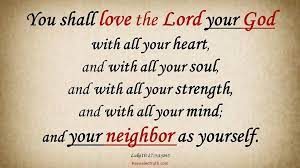HOMILY WEEK 09 04 – Year I
Living the Great Commandment
(Tobit 4; Psalm 128; Mark 12:28-34)
*************************************************
How does one enter the reign of God?
The answer is simple – keep the Great Commandment that Jesus gave us to love God, others and ourselves.
Dr. Glasser, originator of Reality Therapy, taught that our lives revolve around met or unmet needs. He mentions many needs such as food, shelter, love, security, freedom, laughter, a certain degree of power, etc. I prefer to boil those needs down to three basic needs: to be loved, to belong, and to be valued. The challenge then becomes – how can we assure that those needs are met?
 Jesus has to be the world’s first and greatest psychologist. He knew those were our most basic needs, so he gave us a way to guarantee they would be met, by giving us the Great Commandment that we see in today’s gospel.
Jesus has to be the world’s first and greatest psychologist. He knew those were our most basic needs, so he gave us a way to guarantee they would be met, by giving us the Great Commandment that we see in today’s gospel.
Essentially, Jesus knew our need to be loved, so he is saying, “God loves you. Believe that, and love God back.” That happens best in worship and praise. That is what we see happening in the prayer of Tobias and Sarah after their wedding in the first reading. What an inspiration – to see a newly wedded couple putting God first in their marriage. That is also what Marriage Encounter teaches in the talk Marriage as Sacrament. Fr. Bob Mitchel OFM puts it this way: “Most people lead lives of activity, into which they try to put in moments of prayer. It should be the other way around – we should lead prayerful lives into which we insert activity.”
Jesus also knew that we need to belong – so he invites us to learn to love others – to trust them, affirm them, bless them, forgive them, understand them, care for them, do good to them. Do all this, and we will have a sense of belonging. A great example of belonging is a support group for addictions, in which participants bare their soul to others in trust who in turn accept them as they are, with no cross-talk. That, for St Paul in 1 Corinthians 13, is love at its purest – trust and acceptance.
Above all, Jesus knew our need to be valued, to know that our lives make a difference to someone. So, he instructs us to love ourselves, to accept ourselves as we are, to forgive ourselves our mistakes of the past, to stop beating ourselves up for them, and to believe in ourselves. That is perhaps our greatest failing and sin – to not really love ourselves. So many people are co-addicts, enablers and co-dependent because of their insecurity and inability to believe in themselves. There is even a book out there entitled, Women Who Love Too Much.
Not only is this commandment of Jesus deservedly called “great” as it is the core of the gospel – it is also called “new”. The reason for that is the uniqueness of the Great Commandment. All the Jews were familiar with the first part – to love God with our whole being. That is the Great Schema of the bible and Jewish religion, found in Deuteronomy 6:4-9. What Jesus did that is unique is reach back to an obscure teaching buried and almost lost in the book of Leviticus 19:18 (You shall love your neighbour as yourself), lift it out of that plethora of laws, and make this single phrase equal to the Great Schema of Judaism.
No one had dared or thought of doing this before. Now it is just as important to love our neighbour and to love ourselves, as it is to love God with our whole being! In fact, one could say that the best way to love God is to love our neighbour as we love ourselves. That teaching occurs elsewhere in different ways throughout the ministry of Jesus. One example is when he tells us that whatever we do to the least of these, his brothers and sisters, we do unto him. St. Paul, in Galatians 5:14, actually dares to say that the whole bible boils down to one sentence: “Love our neighbour as we love ourselves.”
St. Mother Theresa of Calcutta gets it right in her saying, “What you would like to do to Jesus whom you cannot see, do to the person next to you whom you can see, and you will be doing it to Jesus.” And that, according to Jesus, puts us very close to, if not in, the reign of God.
The Eucharist is both a soaking up of God’s love through Word and Sacrament, and an act of loving God back through worship and praise. May our celebration of the Eucharist today empower us to also love others as we love ourselves, and enter into the reign of God here and now.



